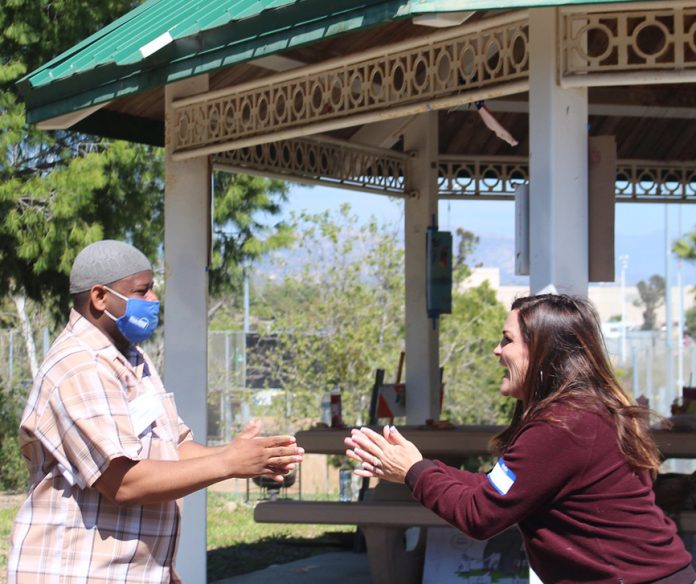
Setche Kwamu-Nana, who is originally from Cameroon facilitated a Santee event on April 3, Weed Out Hate day where 22 people from different races, religions and political persuasions gathered in a community circle to discuss race in a casual setting.
Kwamu-Nana, a former engineer who was once transferred to different Midwestern cities every year for work, describes herself as a country girl who used to live in Santee and chose to settle for good in San Diego. She now works with diversity and inclusion training and said she planned Saturday’s event in part to break down some of the polarity between opposing political groups but primarily to put an end to her own growing sense of mistrust as a Black woman who no longer feels comfortable walking through Santee.
“I’m a country singer but over the past year I’ve had a bit of post-traumatic stress disorder. Even though I’m wearing a cowboy hat and boots, I’m terrified when I hear a truck pull up playing country music, see the American flag in front of someone’s house and I decided I wanted to break that trauma before it became permanent,” Kwamu-Nana said.
Several months ago, she said, she reached out to Santee Mayor John Minto and asked about working with the Santee Community Oriented Policing Committee’s Unity and Inclusion subcommittee, but was told he had already chosen members for the group. So, she rented a gazebo at West Hills park, then invited 38 conservatives and 30 liberals she had met at various political and community events to participate in an honest dialogue about racial tensions and discuss ways to weed hatred out of the community.
Fourteen people from very different backgrounds showed up; several mentioned being “from right here in Santee” and more than a few said they were a bit nervous.
Gathering participants in a circle loosely defined by small American flags and inspirational posters about acceptance printed in bright colors, Kwamu-Nana asked everyone to share something they appreciate about themselves before moving on to more serious topics.
“It’s okay to be jagged,” Kwamu-Nana said, and warned everyone she “would not pretend to be neutral,” setting the stage for people from very different backgrounds to later have intense, honest yet respectful conversations.
After ushering everyone for a cheerful group photo, Kwamu-Nana introduced a serious topic: the cost of polarization in America.
“Before, Black people in America were not allowed to go to school… Among other things, the cost of higher education was raised as a way to keep education exclusive. Now, think of the cost of student loans and how they affect everyone. Our grandkids will suffer from this,” Kwamu-Nana said, paving the way for a serious conversation on racism.
When one white participant said she believed racism is less prevalent than the media has made it out to be in recent years, 43-year-old Shannon Spilman said, she was aware of racism ever since she was a child.
“It has been there all along, now it is just amplified so the people who have lived with the privilege of not having to face the situation are seeing it,” said Spilman, who is Black.
Kwamu-Nana interjected to clarify individual experience is not the same as group experience.
“You know, in Cameroon, I didn’t even know I was Black. Coming to America, the color of my skin now affects my experience,” Kwamu-Nana said.
She used her song, “Black Country Girl” as a jumping off point for dialogues on how unconscious biases affect everyone.
While working in Mississippi, Kwamu-Nana said, “a nice Southern gentleman in my workplace asked what I did in my spare time and I said I like dancing. He said he didn’t know where I could find a good dance spot but a few weeks later overheard me talking about country line dancing and told me he assumed I’d meant hip-hop dancing.”
While not dancing for a few weeks “wasn’t a big harm,” Kwamu-Nana compared it to more serious assumptions like unconsciously assuming someone is more or less dangerous because of their particular skin color.
“Dancing is not a big deal but when these unconscious biases show up in other spaces… how do those narratives create a breeding ground for hate? Now, how do we mitigate it?” she asked.
Although Kwamu-Nana later said she felt the event had moments where conversation grew “heated but good heated,” one participant, Amy Reichert said she did not see defensiveness during the event, and that it was a welcome relief to step away from online commentary into a shared conversation.
“We are not going to be able to talk with each other on social media because the algorithms are stacked against us,” Reichert said.
Seena Ailor said she believes in the power of dialogue and thinks Kwamu-Nana created an event based on conversation.
“We have to learn to talk to each other with patience and understanding. Is that too much to ask?,” Ailor questioned.
Kwamu-Nana closed by asking attendees to celebrate the little wins toward solving major problems, including something “as simple as coming here”.
“The thing I loved most is people saying we have to do it regularly, that it is good for the soul and somebody said it is good for healing the community. Shannon started by saying she felt frazzled and by the end, she said she felt encouraged and energized, which is inspiring,” Kwamu-Nana later said.
Moving forward, she said she plans to hold similar events elsewhere in East County, as well as South San Diego.













